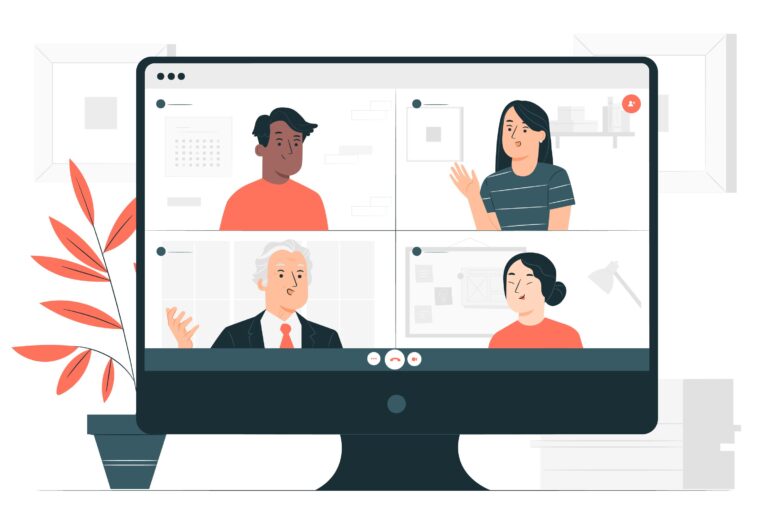Guidelines For A Video Interview

Given the impact of COVID-19 and the current calls for social distancing, it’s likely your next interview could be a video interview. Make sure you’re ready to get in front of the camera by following these video interview tips.
Test your tech
- Do a technical trial run to make sure your device is working correctly. Download any apps or plugins you’ll need.
- Whether you’re using Skype for Business or another video platform, make sure you have a professional username, just as you would with your email address or social media handle.
- Check that your computer’s camera, microphone, and internet connection are working.
Dress to impress:
- For your video interview, you should dress professionally – the same way you would for an in-person interview.
- To look best on camera, avoid bright colors and patterns and opt for softer colors instead.
- If you are wearing a tie, wear a solid color rather than a patterned one.
- If you wear glasses, adjust the lighting in the room to reduce glare from the lenses.
Charge it up
- If you’re using a laptop or tablet, make sure it’s fully charged on the day of the interview.
- Pick a spot that has strong Wi-Fi. If you’re using a tablet, find a way to keep it stationary. Otherwise, the screen may appear shaky if you’re holding the device.
- Avoid using a smartphone for video interviews if possible.
Show up” A few minutes early
- Be a well-prepared early bird. Log in 5 or 10 minutes early so you can be calm and centered when the video interview begins.
- Open up the program where your video interview will take place a few minutes early.
- Close all extra windows and tabs. If you have a portfolio or anything similar you’d like to show via screen share during your interview, make sure that it’s ready in an easy-to-access, but minimized, window.
Maintain good eye contact and body language
- Maintain “eye contact” by looking directly into the camera instead of at the screen or your photo.
- Make sure your face is centered and try not to move around.
- Keep good posture, sitting with your back straight, feet on the ground, and arms resting in your lap or on the desk.
Pay attention to how you sound
- While you practice, make note of how fast you speak, how you pause, and the tone and pitch of your voice, and ask the person you’re practicing with if any of these things make it harder to hear or understand you.
- For the sake of any interviewer with a bad connection, be sure to speak clearly and at a reasonable pace, but keep it natural.
- Since there’s less body language-based communication in a video interview, you also want the way you speak to help get across how you feel about what you’re saying.
Don’t be afraid to ask your interviewer to repeat the question
- Didn’t understand what a recruiter just asked you? It’s okay to pause and ask, “Can you please repeat that?” Or, if you’re in a live video conference, ask the interviewer to rephrase or clarify the part of the question that’s confusing you.
- It’s better to ask than to not answer the question (or to answer the wrong question).
No Googling
- No matter how stealthily you think you can type, it will always be noticed if you’re trying to Google something during the interview.
- Have all the information you need already on the desk in front of you, or already open in your browser.
- Keep any notes you might need in front of you. Don’t rely on them too much, but it can be reassuring to have some basic notes about your examples and achievements in front of you.
- If you spend time during the interview looking at your screen (rather than into the camera) and typing, it’ll just look like you’re distracted and, perhaps, ill-prepared.
Close the video interview by sharing your appreciation
- Just as you would with any interview, thank the interviewer for the opportunity.
- Follow up with a post-interview thank-you notewithin 24 hours. In your note, briefly reinforce why you’re interested in the job and why you’d be a great match for the role and company.
Video interviews are like any other part of the application process. Some people are naturally better or worse at them, but those differences can be easily overcome with practice. With the usual combination of research and diligent practice, you’ll give yourself the best chance possible.
About Us
Futures And Careers (FAC) is a full-service HR firm, incorporated in 2007 at Bangalore. With a razor-sharp focus on delivering fast results for our clients, we have been successfully handling hundreds of ‘Talent Acquisition’ requirements of our clients every single year.
Contact Us
- #413, Ground Floor, 5th C Main Road, 4th D Cross,2nd Block, HRBR Layout, Kalyan Nagar, Bengaluru-560043
